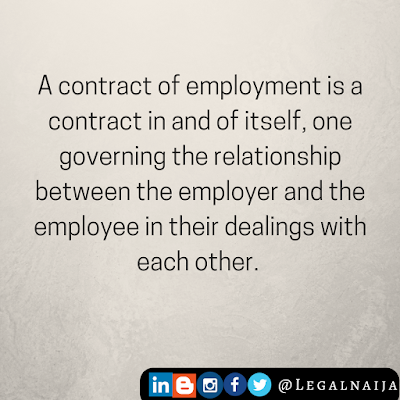
Essentials of a Contract of Employment | Kingsley Ugochukwu Ani

A contract of
employment is necessary whenever a person wants to undertake a position with an
employer. But before signing the contract, the employee should endeavor to
understand the ramifications of what he is setting his signature to. If
possible, such employee should try and understand all the clauses in the
contract of employment before signing same. If there are gray areas in the
contract of employment, then he should forward same to a lawyer to go through
the contract for him with a fine-tooth comb before appending his signature.
employment is necessary whenever a person wants to undertake a position with an
employer. But before signing the contract, the employee should endeavor to
understand the ramifications of what he is setting his signature to. If
possible, such employee should try and understand all the clauses in the
contract of employment before signing same. If there are gray areas in the
contract of employment, then he should forward same to a lawyer to go through
the contract for him with a fine-tooth comb before appending his signature.
A contract of
employment is a contract in and of itself, one governing the relationship
between the employer and the employee in their dealings with each other.
employment is a contract in and of itself, one governing the relationship
between the employer and the employee in their dealings with each other.
Ingredients
present in contracts of employment
present in contracts of employment
There are
certain clauses that should be contained in a contract of employment. There are
certain industry-wide essentials that encompass contracts across all spheres of
work, and there are certain clauses that are industry-specific, taking into
cognizance the nature of Industry, the work expected of the employee, the
confidentiality involved alongside the technical expertise, among a host of
other considerations.
certain clauses that should be contained in a contract of employment. There are
certain industry-wide essentials that encompass contracts across all spheres of
work, and there are certain clauses that are industry-specific, taking into
cognizance the nature of Industry, the work expected of the employee, the
confidentiality involved alongside the technical expertise, among a host of
other considerations.
Example:
Mr A is
employed as a teacher in a community secondary school. In his contract of
employment (if any), the employer cannot just insert a Non-Disclosure clause or
prepare a separate Non-Disclosure Agreement. The reason is because of the fact
that there is probably no confidential information Mr. A is going to be
handling during the duration of his employment. He is teaching students, right?
employed as a teacher in a community secondary school. In his contract of
employment (if any), the employer cannot just insert a Non-Disclosure clause or
prepare a separate Non-Disclosure Agreement. The reason is because of the fact
that there is probably no confidential information Mr. A is going to be
handling during the duration of his employment. He is teaching students, right?
However, the
same will not be applicable in an employment where the employee handles high
stakes business for his employer, with attendant secrets which the employer
might be worried about.
same will not be applicable in an employment where the employee handles high
stakes business for his employer, with attendant secrets which the employer
might be worried about.
Clauses in a
contract of employment
contract of employment
1. Name of parties
and designation: the parties’ names and their designation, whether as
employer and employee should be clearly stated.
and designation: the parties’ names and their designation, whether as
employer and employee should be clearly stated.
2. Address of the
business: this is the address where the employer carries on
business and where the (prospective) employee will work.
business: this is the address where the employer carries on
business and where the (prospective) employee will work.
3. Commencement
date: the date the parties are entering into the contract of
employment should be stated too for avoidance of doubt. There might be need too
for a termination date if the contract is time-specific.
date: the date the parties are entering into the contract of
employment should be stated too for avoidance of doubt. There might be need too
for a termination date if the contract is time-specific.
4. Salary: the
remuneration, mode of payment, and regularity, plus other factors regulating
the payment of the employee should be set down.
remuneration, mode of payment, and regularity, plus other factors regulating
the payment of the employee should be set down.
5. Hours of work: this could be
stated as 8 AM to 5 PM, etc, depending on the working billable hours of the
firm.
stated as 8 AM to 5 PM, etc, depending on the working billable hours of the
firm.
6. Non compete
clause: this clause is usually inserted for the protection of
the interest of the employer in the deal. It can state that within a stated
period (which should definitely not be unreasonable) from the date of the
termination of the employment of the employee, that he shall not set up a
similar business within a particular physical radius from the address of the
employer’s business.
clause: this clause is usually inserted for the protection of
the interest of the employer in the deal. It can state that within a stated
period (which should definitely not be unreasonable) from the date of the
termination of the employment of the employee, that he shall not set up a
similar business within a particular physical radius from the address of the
employer’s business.
7. Copyright: During the
duration of the employment of a particular employee, an employee might produce
a copyright-able work. This clause might serve to transfer copyright in any
work-related, industry-specific work created by the employee, especially if
said work was produced using the materials of the employer, on the employer. Or
it can serve to share the copyright between both parties. (Employees should be
careful of this and try to consult with an intellectual property law expert
before agreeing to this).
duration of the employment of a particular employee, an employee might produce
a copyright-able work. This clause might serve to transfer copyright in any
work-related, industry-specific work created by the employee, especially if
said work was produced using the materials of the employer, on the employer. Or
it can serve to share the copyright between both parties. (Employees should be
careful of this and try to consult with an intellectual property law expert
before agreeing to this).
8. Course of
disciplinary action against employee: This will serve
to showcase the mode of conducting disciplinary actions against an employee
should the employee go against the rules of the employer’s workplace.
disciplinary action against employee: This will serve
to showcase the mode of conducting disciplinary actions against an employee
should the employee go against the rules of the employer’s workplace.
9. Overtime: if in the
contract of employment, the work periods of the employee is clearly stated,
then this will serve to show how the employee can be remunerated for work done
by him outside his work periods for the employer’s business.
contract of employment, the work periods of the employee is clearly stated,
then this will serve to show how the employee can be remunerated for work done
by him outside his work periods for the employer’s business.
10. Employee
performance review: many employers can insert this clause in the contract
of employment of the employee for periodic review of the work performance of
the employee. This becomes necessary in a firm which has a hierarchical upward
promotion system so as to check whether an employee is due for upward promotion
in his work.
performance review: many employers can insert this clause in the contract
of employment of the employee for periodic review of the work performance of
the employee. This becomes necessary in a firm which has a hierarchical upward
promotion system so as to check whether an employee is due for upward promotion
in his work.
11. Ethics: This basically
will serve as the code of conduct that the employee is expected to abide by in
his work for the employer.
will serve as the code of conduct that the employee is expected to abide by in
his work for the employer.
12. Termination of
employment; notice of termination: under this
particular clause, a lot can go in, including the intention of either party to
terminate the contract between them, the notice to be given, remuneration
during the period of notice, etc. NB: employers should take particular care
in this clause because of the strong laws that exist to protect the interest of
the employee against wrongful termination of employment.
employment; notice of termination: under this
particular clause, a lot can go in, including the intention of either party to
terminate the contract between them, the notice to be given, remuneration
during the period of notice, etc. NB: employers should take particular care
in this clause because of the strong laws that exist to protect the interest of
the employee against wrongful termination of employment.
13. Vacation: the employer
might insert this clause to give employee periods within which he can take
leaves from the workplace and still be paid for it; duration, etc.
might insert this clause to give employee periods within which he can take
leaves from the workplace and still be paid for it; duration, etc.
14. Study Leave: mostly applies
to employees working in institutions of higher education.
to employees working in institutions of higher education.
15. Sick leave
16. Insurance
coverage: some employers might be considerate enough to include
such clauses that make for mandatory insurance schemes for incoming employees
who are not yet covered under any insurance scheme. It can deal with: amount to
be remitted from employee’s salary, amount the employer will add, etc.
coverage: some employers might be considerate enough to include
such clauses that make for mandatory insurance schemes for incoming employees
who are not yet covered under any insurance scheme. It can deal with: amount to
be remitted from employee’s salary, amount the employer will add, etc.
17. Health coverage
18. Work-related
travel: some employers might provide for this, mostly to the
effect that they will shoulder the entire expenses to be accrued by the
employee.
travel: some employers might provide for this, mostly to the
effect that they will shoulder the entire expenses to be accrued by the
employee.
19. Salary scale
20. Non disclosure
clause: will apply to keep the lips of the employee sealed
against revealing any confidential information that the employer considers
important enough, or what they consider their trade secrets from being revealed
by the employees after the employee has left the service of the
employer.
clause: will apply to keep the lips of the employee sealed
against revealing any confidential information that the employer considers
important enough, or what they consider their trade secrets from being revealed
by the employees after the employee has left the service of the
employer.
The list is
basically endless.
basically endless.
There are a lot
of clauses that can go into an employee’s contract of employment and these
depend on the nature of the work, and in some cases, on the industry the
employee is getting into. It can also depend on what the parties want covered.
of clauses that can go into an employee’s contract of employment and these
depend on the nature of the work, and in some cases, on the industry the
employee is getting into. It can also depend on what the parties want covered.
Point to Note: The employee
should be careful so as not to agree to terms that would be considered by an
expert as onerous and detrimental to his interests.
should be careful so as not to agree to terms that would be considered by an
expert as onerous and detrimental to his interests.
Finally, the
parties will sign and date the contract, and it will have a binding force of
the Law should either of the parties try to renege on the terms of said
contract.
parties will sign and date the contract, and it will have a binding force of
the Law should either of the parties try to renege on the terms of said
contract.
About the
Author:
Author:
Kingsley
Ugochukwu Ani is a corporate lawyer with particular emphasis on Real Estate, IT
& IP areas of the law. He can be reached on aniugochukwu@gmail.com
Ugochukwu Ani is a corporate lawyer with particular emphasis on Real Estate, IT
& IP areas of the law. He can be reached on aniugochukwu@gmail.com





